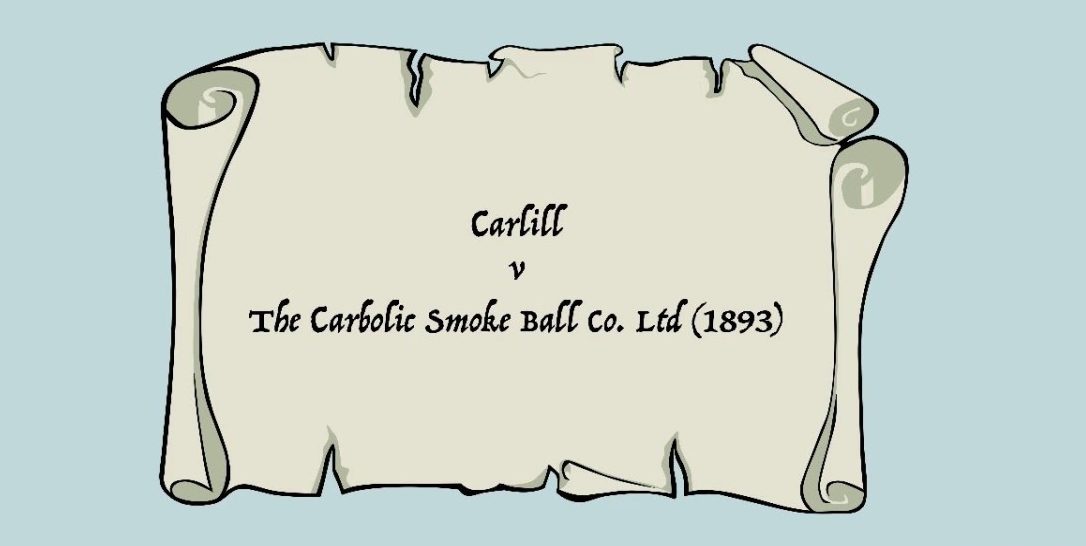When the offer is made who was specific or an ascertain person it is known as a specific offer, but when the same is not made to any particular person but to the public at large it is known as a general offer. This general offer will be deemed to be accepted by anyone who actually performs the conditions of the proposal. The landmark case of ‘General Offer’, Carlill v. Carbolic Smoke Ball Co[1]. is discussed below.
FACTS
The defendant, Carbolic Smoke Company advertised that their product ‘smoke ball’ can cure influenza and if anyone catches influenza or cold even after using it for two weeks, thrice daily, then they will be rewarded with 100 pounds. In furtherance to their intentions, the company stated that they have deposited 1000 pounds with the alliance bank.
The plaintiff Mrs Louisa Carlill saw this advertisement and used it from Mid-November 1981 to January 1982 but unfortunately caught influenza. Her husband wrote to the Carbolic smoke Co. to claim compensation.
The company initially ignored the letters and then claimed that she did not use the drug as per the instructions provided by them. They then stated that the advertisement was merely an offer and there was no contract between them. Carlill filed a case against the company.
ISSUES
Whether the offer made by the defendants and acts done by the plaintiff constitute a valid offer and acceptance, thereby creating a binding contract?
ARGUMENTS
Contentions of the Plaintiff
- That the advertisement was not an intention to offer but an offer.
- That the act done by Mrs Carlill after reading the advertisement qualifies as an acceptance and thus creates a valid contract.

Contentions of the Defendant
- There was no particular offer to Mrs Carlill as the advertisement was meant for everyone, hence, there is no contract between the company and Mrs Carlill.
- There was no communication of acceptance by the plaintiff
- The advertisement was vague as anyone could have claimed that they used the smoke ball and still caught influenza.
OPINION OF JUDGES
LORD JUSTICE LINDLEY
He started by tackling the issue revolving around the legitimacy of the offer. Pondering if it was an offer, which when accepted and conditions of acceptance performed would constitute a contract or whether it was just a “puff”. He referred to the line in the advertisement where it was mentioned that 1000 pounds were to be deposited with the alliance bank asking what that money was for?
He also stated that the offer was not vague as it specifically mentioned the dose of the drug, two weeks, thrice daily.
Lord Justice Bowen
While concurring to Lindley L.J., he stated that any offer made to the public at large can ripen into a contract if all the conditions of the offer are met. And in this case, any special notification or acknowledgement of acceptance of the contract is not required. Commenting on the defendant’s contention on the vagueness of contract as there is no time limit, he opined that, a reasonable time period is subjective and would differ from case to case. As in this case, the drug was advertised to prevent influenza during the Flu-epidemic, hence, if anyone contracted influenza during that period (1889-1890) they would be eligible for compensation.
Lord Justice A.L. Smith
He gave a broad judgement concurring with the other two judges. On the question of consideration, he said there are two considerations in this arrangement,
The first one is the inconvenience caused to the plaintiff by using this smoke ball for two weeks, three times a day. The other one is the monetary gain to the defendants due to the increased sale of the smoke balls.
Hence, the presence of a legitimate consideration along with offer and acceptance makes it a contract.
JUDGEMENT
The judges unanimously held that:
- The offer was not a mee unilateral offer to the whole world, but to those who after reading the offer acted upon it and thus fulfilled the conditions.
- That purchasing and using the smokeball was a good enough consideration as it was clearly benefitting the company.
- The deposit of 1000 pounds at the alliance bank shows the company’s intention to be legally bound.
CONCLUSION
The judgement is very crucial and to date acts as a precedent to contract law cases in the UK as well as India. The case also established a framework to scrutinize false and misleading advertisements. As in this case, the company exploited the benefit from the advertisement but then refused to take responsibility in case of failure.
The judgment provides a study on the essentials which are involved in a valid contract and defines the concept and limits of a unilateral contract.
[1] (1893) 1 Q.B. 256
